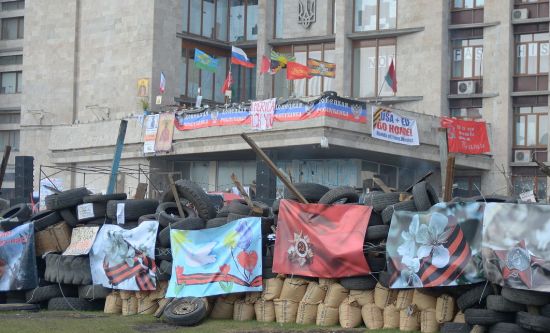
On 2 November millions of voters in eastern Ukraine took to the polls, electing new MPs and Prime Ministers to the People’s Republics of Donetsk (DNR) and Lugansk (LNR). With more than 300 international observers present, and not a single violation reported, turnout in the war-torn region was almost unprecedented. In Lugansk 62% of the electorate lined the streets to vote, while in Donetsk mobile polling stations almost ran out of early ballots; polling stations set up in the refugee camps near the Russian border saw similar scenes, with turnout at Belgorod reaching 70%.
The contrasts with the snap parliamentary election called by the Kiev government on 26 October could not be greater. Virtually boycotted in the east, official accounts placed turnout at 52%, a historic low, for an election marked by ballot stuffing, voter intimidation and violent repression of opposition groups. The result was a predictable victory for the oligarchy, as Prime Minister Yatsenyuk’s People’s Front party gained 22.14% of the vote and the President’s Petro Poroshenko Block took 21.82%; four of the five other parties meeting the 5% threshold to enter the Rada (parliament) are openly fascist.
Oligarchs and fascists close ranks
The new composition of the Rada reflects ruling class frustrations with President Poroshenko’s failure to reconquer the east, with the new coalition government representing an ever-rightwards lurch towards neoliberalism and open conflict with Russia. Any separation between the oligarchy and the fascists, whose militants spearheaded the coup against former president Yanukovich, shrinks with each passing day as fascists become integrated into state organs and mainstream political parties. The two months since the neo-Nazi Azov Battalion was upgraded to an official military regiment have seen the appointment of unapologetic fascists into high-level positions, including Yuri Michalchyshyn, who holds an honorary medal from the SS division Galychna, as head of propaganda for the Ukraine Security Service and Vadim Troyan as head of the Kiev police. Open neo-Nazis like Andriy Biletsky and Andriy Parubiy have been elected as MPs on People’s Front tickets; national chauvinist slogans like ‘Glory to the heroes’, popularised by Nazi collaborators like Stepan Bandera, have entered the political mainstream. Even a failed prime ministerial bid by ‘Darth Vader’ saw the candidate wearing a traditional Ukrainian haircut and strumming a bandura.
The rehabilitation of Stepan Bandera and his ‘Ukrainian Insurgent Army’ has become ruling class policy – according to Poroshenko ‘an example of heroism and patriotism’. The anniversary of its founding has been made a national holiday, allowing thousands of armed fascists to march through cities unopposed. No such sympathy was extended to the vigils commemorating the October Revolution, which were attacked by fascists in Dnepropetrovsk, Kharkov, Melitopol and Odessa. The US ruling class supports these developments, joining arms with Canada and Ukraine on 21 November to vote against a UN General Assembly resolution condemning Nazi ideology and the denial of Nazi war crimes.
Russia: the siege continues
On 12 November the Ukrainian military declared its intentions to redeploy troops in the east, accusing Russia of sending troops and tanks across the border to equip and train the DNR and LNR armed forces. In reality, the Ukrainian military has never left the east – 957 deaths, mostly caused by its troops, have been documented since the ‘ceasefire’ began – and has still not presented any evidence for the alleged Russian incursions. Baseless claims are excuse enough for the imperialists, who continue to provoke Russia and its President Vladimir Putin. In November alone NATO undertook no fewer than three military exercises near Russia’s border in Estonia, Lithuania and Poland, alongside its largest ever computer defence exercise. The anti-Russian propaganda barrage continues, including a well-advertised November visit to Britain by the anti-Putin band Pussy Riot and several attacks on Russia Today and its staff.
Economic sanctions have begun to expose Russia’s vulnerability to external shocks, with forecasts for a 1% fall in GDP and 9% fall in imports by the end of 2014. Zero growth is projected for 2015. The decision by Exxon to freeze all ten of its joint ventures with Rosneft because of sanctions bodes ominously for the oil and gas industries, which account for more than half of the Russian state budget and are heavily reliant on western service companies. Russian oil production is expected to fall in 2015, the first significant decline since 1998. The rouble has faced a significant decline and capital flight has doubled to $128bn by the end of 2014. Under this state of siege Russia’s current position, retaining a small trade surplus and $370bn foreign exchange reserves, cannot last forever. Any crisis in the Russian economy will be felt in Europe, which accounts for 41% of all Russian trade. The Russian government accuses the US and EU of using sanctions to try and force regime change on Russia.
Social crisis deepens
While the imperialists and Ukrainian ruling class continue their crusade against Russia and the east, Ukraine’s national economy and domestic affairs are in tatters. The war on the east has cost nearly $4.6bn and remains deeply unpopular; unrest has begun to spread through the army, with 300 conscripted soldiers marching on Kiev on 13 October demanding their demobilisation. National debt has climbed to 70% of GDP, roughly $14bn of external debt repayments are due by December 2016 and the national currency has entered freefall; since the beginning of 2014 its value against the dollar has halved. In a failing effort to stabilise the currency the Ukrainian Central Bank sold $1.3bn of foreign currency reserves between mid-September and early November, its gold reserves having almost completely disappeared. Inflation is almost 20% and is forecast to rise. So long as the imperialists continue to send cash for arms the Ukrainian ruling class could not care less about the social crisis; how long the working class in Russia and Ukraine will accept it is a different question altogether.
Jack Edwards




